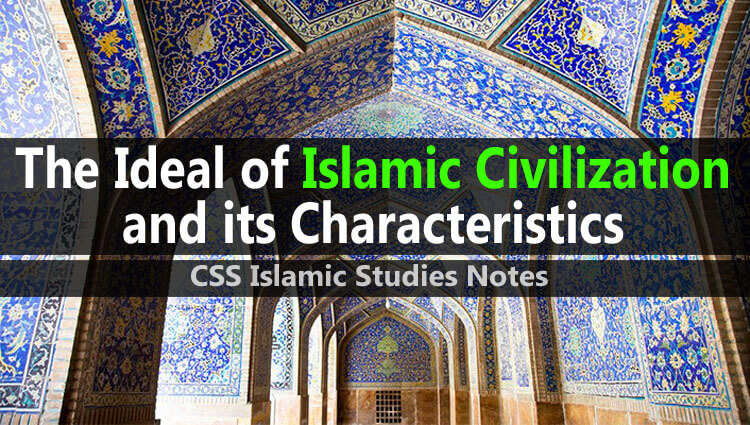The Ideal of Islamic Civilization and its Characteristics (CSS Islamic Studies Notes)
At the very start of this discussion, it should be evident that the whole issue of an ideal is deeply linked with the subject of worldview or Weltanschauung. Whatever view we maintain about the temporal world and whatever view we have about our role in that temporal world and the place of the corporeal world in our lives naturally generates an ideal for life. Accordingly, we begin to spend all our energies towards the establishment of that ideal. If we consider the world to be a pasture, and our view of life defines it’s as time period granted us for eating, drinking and being merry, then this animalistic concept will necessarily inculcate within our beings a primeval and corporeal ideal. We will then spend all our lives in efforts to obtain the materials that impart sensual pleasure.
On the contrary, if we consider ourselves to be natural wrongdoers and instinctive sinners, and our view about this world is that of a place of torment in which we have been thrown for suffering the punishment of our inborn delinquency, then naturally this concept produces in us a desire for release from this affliction, and upon this basis we consider salvation to be our ideal. However, it our concept about the temporal world is beyond that of either a pasture or a torture chamber, and, as human beings, we consider ourselves to be above and superior to both animals and criminals, we will certainly look for an ideal that is loftier that the mere pursuit of physical pleasures or the attainment of salvation. Our insightfulness then does not stop at any inferior and lowly standpoint.
Read also: Islamic Studies MCQs
Keeping this principle before us, when we see that Islam had declared man to be God’s viceroy and His representative on earth, then the intellect necessarily reaches the one ideal that can and should naturally arise from this worldview. By virtue of being a viceroy what else can the ideal of the subordinate representative be other than attaining the approval and pleasure of the power that represents and that he be considered a good, loyal, and conscientious employee? If a person is a truly straightforward and well-intentioned individual can he make his ideal anything else except service to the superior and attainment of his pleasure? Would such a person fulfill his duty only because of a longing for an increase in his payment, an incentive for promotion or reward, or a desire for enhancement in rank or status? It would be altogether a different matter that upon being pleased, this superior grants him all these, or holds out the promise of granting all these in return for superior performance. Moreover, there would be no harm in bearing the self-knowledge that if the person was to carry out his duties in the best manner possible and please the superior then they said rewards would be his. On the other hand, if he were to make the rewards his goad. And perform his duties only because of the expectation of gain would any wise person call such a servant dutiful?
Read also: Important Battles of Islam
Based upon this illustration, we may reflect on the subject of God and His viceroy. If man is considered to be God’s viceroy on earth, can the ideal of his life be anything but the seeking of His approval and pleasure? This is the ideal that the intellect and innate disposition create out of the said worldview. Without any omission, this precisely the ideal the Islam has presented to humankind. By following the statements of the Quran given below we can see that the whole Endeavour is directed towards placing this one ideal in the hearts and minds of people and towards internalizing it by employing different forms of address. Simultaneously, there is also a forceful negation of all other viewpoints. The Quran states.
“Surely my Prayer, all my acts of worship, and my living and my dying are only for Allah, the Lord of the whole Universe. He has no associate. Thus have I been bidden, and I am the foremost of those who submit themselves (to Allah).” [Al-An am 6:162-163]
“Surely Allah has purchased of the believers their lives and their belongings and In return has promised that they shall have Paradise. They fight in the Way of Allah, and slay and are slain. Rejoice, then, in the bargain you have mad with Him. That indeed is the mighty triumph.” [Al-Tawbah 9:111]
In Surah al-Baqarah, while distinguishing the obedient person from the disobedient, the former is described as:
“Among men there is a kind who dedicates his life seeking to please Allah; Allah is immensely kind to such devoted servants.” [Al-Baqarah 2: 207]

In Surah al-Fath Muslims have been described as a people whose friendship and enmity, whose devotions and prostrations, are all for Allah:
“Muhammad is Allah’s Messenger, and those who are with him are firm with the unbelievers but compassionate with one another. You see them occupies in bowing and prostrating and in seeking Allah’s bounty and good pleasure.” [Al-Fath 48:29]
In Surah Muhammad, the reason for the loss of the unbelievers’ deeds is described by pointing out the fact that they do not do anything for God. Instead, they act out of motivation for achieving other objective, and thus do not earn God’s pleasure:
“That is because they have followed a way that angered Allah, and have been averse to His good pleasure. So He reduced all their works to nought.” [Muhammad 47:28]
In Surah al-Hajj, such worship of God that is actually undertaken for worldly benefit is declared to be totally useless which will entail only misery:
“And among people is he who worships Allah on the borderline; if any good befalls him, he is satisfied; but if a trial afflicts him, he utterly turns away. He will incur the loss of this world and the Hereafter. That indeed is a clear loss.” [Al-Hajj 22:11]
In Surah al-Baqarah, it is stated that charity given for public display, and wealth whose mention is constantly reiterated after being given away, is malevolent. The parable with which it is described is that of a rocky surface that is covered with a very thin layer of soil, and which after being planted with seed is washed away by a torrent. On the other hand, charity that is given a positive personal affirmation and purely for God’s pleasure is likened to garden, which while receiving a fair rainfall yields superior fruit, but is nonetheless sufficiently productive even with a small drizzle and does not require a heavy downpour. (cf. Surah al-Baqarah 2:264-65)
This theme of doing good act exclusively for God’s pleasure and not associating any other purpose with it is described in various contexts at different points:
“Whatever wealth you spend in charity is to your own benefit for you spend merely to please Allah” [Al-Baqarah 2:272]

“(Those) who are steadfast in seeking the good pleasure of their Lord; who establish Prayer and spend both secretly and openly out of the wealth We have provided for them, and who ward off evil with good. Theirs shall be the ultimate abode.” [Al-Ra’d 13:22]
“The God-fearing who spends his wealth to purify himself; not as payment for any favors that the received, but only to seek the good pleasure of his Lord Most High. He will surely be well-pleased (with him)” [Al-Rum 30:38]
“As for the Zakat that you give, seeking with it Allah’s good pleasure, that is multiplied manifold.” [Al-Rum 30:39]

“Those who, for the love of Him, feed the needy, and the orphan, and the captive (saying): ‘We feed you only for Allah’s sake; we do not seek of you any recompense or thanks, we fear from our Lord a Day that shall be long and distressful.’ So Allah shall guard them against the woe of that day, and will procure them freshness and joy.” [Al-Dahr 76:8-11]
“It also belongs to the poor emigrants who have been driven out of their homes and their possessions, those who seek Allah’s favor and good pleasure and help Allah and His Messenger. Such are the truthful ones.” [Al-Hashr 59:8]
“Allah indeed loves those who fight in His Way as though they are a solid wall cemented with molten lead.” [Al-Saff 61:4]
“Those who have faith fight in the Way of Allah, while those who disbelieve fight in the way of Taught (Shaitan).” [Al-Nisa 4:76]
All this teaching has been rendered into one sentence by ‘the one who was unsurpassed in pithy eloquence’ the Prophet Muhammad (peace be on him). In fact he stated the one basic principle that encompasses all charitable acts and acts of worship. The words of the Hadith (tradition) are
“Allah only accepts those deeds that are purely for Him and for the sole purpose of earning His Pleasure.” [Al-Nisa 1]
From the discussion, it is clear that, putting aside all intents and purposes of this world and the Hereafter, Islam makes just one thing the ideal of life, the ultimate goal of all human endeavors, and the fundamental principle of all intentions and desires: namely, the attainment of Allah’s Will and His pleasure. Now we need to see as to what are the characteristics of this ideal that make it the best of all ideals.
Check Our Complete collection CSS Islamic Studies
- The Establishment of the First Islamic Empire | Islamiat MCQs
- Holly Prophet (PBUH) Prophethood to Migrate to Madina MCQs | Islamiat MCQs for CSS
- Seerah of Holy Prophet Muhammad (PBUH) As Individual | CSS Islamic Studies
- Life of Holly Prophet (PBUH) before Prophethood MCQs | Islamiat MCQs for CSS
- Arabs Before Islam | Islamiat MCQs for CSS and All Competitive Exams
- The Prophets (A.S) MCQs | Islamiat MCQs for CSS and Competitive Exams
- World Religions MCQs | Islamiat MCQs for CSS and Competitive Exams
- ISLAMIAT Important & Selected Solved MCQs (Download in PDF)
- Islamic Belief & Its Impact on Individual & Society and the Fundamental of Islam
- Islamiat MCQs (CSS Past Papers 2005-2016) | PDF Notes for CSS







